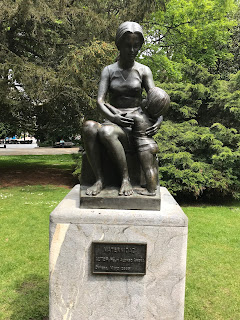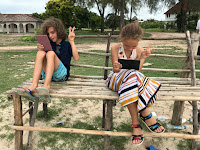 Modern travel allows us only the briefest opportunity for transition – in mere hours we can travel cultural and linguistic distances that are so vast they seem more appropriate for a long camel ride than a few hours in a jet. But even air travel affords progressive (though brief) phases of adjustment. Arriving at most airports, you’re greeted with an already slightly international context – more multilingual signs, standard icons to communicate. As you near your gate, you may see people dressed like or speaking the language of your destination, which intensifies on the flight. The airline announcements might include the languages of where you’ve come from and where you’re going – a doorway or portal between two worlds. Some people even change clothes on a flight to be more appropriate or climate-comfortable on arrival. The destination airport will still have international language and icons, and typically bathrooms like I’m used to, and then you leave the airport and are . . . wherever you are.
Modern travel allows us only the briefest opportunity for transition – in mere hours we can travel cultural and linguistic distances that are so vast they seem more appropriate for a long camel ride than a few hours in a jet. But even air travel affords progressive (though brief) phases of adjustment. Arriving at most airports, you’re greeted with an already slightly international context – more multilingual signs, standard icons to communicate. As you near your gate, you may see people dressed like or speaking the language of your destination, which intensifies on the flight. The airline announcements might include the languages of where you’ve come from and where you’re going – a doorway or portal between two worlds. Some people even change clothes on a flight to be more appropriate or climate-comfortable on arrival. The destination airport will still have international language and icons, and typically bathrooms like I’m used to, and then you leave the airport and are . . . wherever you are.  |
| Big Gerrans Family Reunion! |
Our most recent travels took us from central Norway (Averøy), to near Oslo (Hvalstad) for 2 nights (including a joyous reunion with playmate Robin), and then to Tennessee where we were lucky to join a Gerrans Family Reunion. This was Neil’s dad (Wes) and his siblings – and their offspring, about 60 people. Beautifully hosted by Tom and Cindy, it was a chance to meet or reconnect with many cousins. The kids really enjoyed playing together (including from quite varied play styles, I was really proud of how my two jumped into the fray). Then we got to spend 3 more beautiful days with a smaller group – Neil’s immediate family and some close cousins at their cabin in Eastern Tennessee. Campfires, smores, bread on a stick, games, hikes, outings. Unfortunately then
COVID decided to reappear! :-\ Kamilla was the first to feel some symptoms, we tested her the next day and yep. Fortunately her symptoms were very mild, and we don’t seem to have passed it on to anyone in that group. We drove onward to Atlanta, where we holed up and tried to quarantine while we saw my sister (Rakilly), mostly outside. Getting acquainted with Killy’s dog Piper was a joy!! We went on lots of walks, and hung out or ate by the pool. We tried, unsuccessfully, to not share germs with Killy. We flew home to Seattle after Kamilla’s most-infectious period was past. Unfortunately once home Neil then tested positive, too, tho fortunately his symptoms were also very mild. 
More immediate (Neil's) Gerrans Family
 |
| Good-bye to my sister Killy! |
Getting home mid-morning on July 3, we were all in our feelings! I started crying as we walked up to our house. Spencer started kissing the doors and walls as we entered. Even tho it was mostly empty, and very overgrown outside, its home, with all the beautiful familiarity. We concurrently moved back in (initial focus on soap/towels in each bathroom and places we could each sleep that night!), tried to quarantine from each other and the outside world, tried to restock enough to eat, etc.
“Home – the story of who we are and the collection of things we love.” (Plaque in my sister Rakilly’s home)
It's delicious to be home. As we reintegrate into our lives here, I’m trying to move slowly, with ease and grace. Personally, I’m ready for familiarity and routine. And I’m enjoying reconnecting with friends and neighbors who we’ve known for years. We've had such fun having cousin-time with my niece and sister. The kids were delighted with their first-ever in-person music lessons yesterday, such a treat.
Also, as always coming back to the US is a reminder that travel gives you a different perspective. It changes us – that’s often why we / I do it. My biggest take-away on the Norway > US transition, is how thin the safety net is in our country, and that we’re all a little more raggedy for it. Seems that many in Seattle continue to struggle with homelessness as property prices remain high, and I see people being challenged as they leave stores having not paid for what they need – this multiple times in the 3 weeks I’ve been home. The hearings about the January 6 Attack on the US Capitol are sobering, as we try to hone, strengthen, redefine our democracy and make it benefit more people. And yet with all its flaws, this is my home, and my culture, and my people. And as I help my family settle in, and determine my next chapter of work contribution, I know that I’m lucky to be here relative to many places, and I’m lucky to have the privileges I have here. Now how to make my little corner better? 
Aunty time! 
Ready for Dad's Birthday!
My Google maps now has ❤️hearts spread in so many places where we traveled – favorite cafes, produce shops, bakeries, people, tours, parks, hikes, playgrounds, homes we lived in. It feels fitting to see those hearts as I scan the map. I truly have left my heart in many places around the world. I’m grateful to sooo many people, from those I’ve come to know well and will stay in touch with, to those with whom I simply had a kind or poignant brief interaction . . .
- The man who checked us in for our flight in Arusha, and when I told him of our year of travel, said, “Oh, I wish you could adopt me. I love, love, love to travel and I really haven’t been able to outside of Tanzania” – and I could really feel his desire.
- The woman in the Juba airport women’s restroom who offered I go first into the available stall, with a kind smile and gesture, saying “Sister, are you much pressed?”
- The sweet owner of the shop where I bought produce and eggs near our home in Tbilisi who openly grieved her favorite pet bird who’d been killed by a street cat that she’d adopted – made worse since she’d shown the culprit mercy when he was in need.
The AirBnb host who sadly lost his dad to covid, and yet still was gracious when we shared that we’d recovered from covid while staying at his place; and then spontaneously drove us to the airport rather than us calling a taxi. - Our gracious guesthouse host in Georgia who is now a friend, and her sweet neighbor who made us the best-ever lobiani (bread with beans inside) in Georgia as a “for the road” present. We left with such delicious and beautiful foods made with love.
Back in the Pacific Northwest - Our Tanzanian taxi driver (several times) who shared his heart about the challenging politics and how disillusioning it is when you feel your vote doesn’t matter.
Thank you for being interested in our journey, and much love to each of you in our worldwide community.
“Perhaps travel cannot prevent bigotry, but by demonstrating that all peoples cry, laugh, eat, worry, and die, it can introduce the idea that if we try and understand each other, we may even become friends.” – Maya Angelou
























